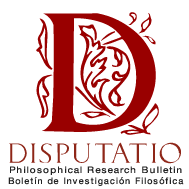Simon Blackburn
University of Cambridge, UK | swb24@cam.ac.uk
Received: 3-January-2018 | Accepted: 30-March-2018 | Published: 30-June-2019
Disputatio [Jun. 2019], Vol. 8, No. 9, pp. 00-00 | DOI: 10.5281/zenodo.2642429
Article | [EN] | Full Text | Statistics | Copyright Notice [es] | Vol. 8 No. 9
How to cite this article:
Blackburn Simon. (2019). «Wittgenstein and Brandom: Affinities and Divergences». Disputatio. Philosophical Research Bulletin 8, no. 9: pp. 00-00.
Abstract | It is not difficult to find both affinities and divergences in the work of Wittgenstein and Brandom but this particular text explores several key issues beyond first impressions and reveals hidden divergences in supposed similarities and occasionally less profound dissimilarities where their philosophies seem to differ radically. Both Wittgenstein and Brandom (as well as Dewey), while agreeing that representations cannot be taken to be primitive, would not approve of Rorty’s drive to jettison the very idea of representation along with that of truth. Wittgenstein, on the other hand, “is averse to any attempt at general, explanatory, theories of how language works” while “Brandom is much more positive about the possibility of general, systematic and explanatory theories of meaning.” The divergence about the builders of Philosophical Investigations § 2 and their language use is traced back to Wittgenstein’s being essentially a worldly pragmatist, while Brandom’s practice is essentially intralinguistic. In the second part, the text takes issue with Brandom’s theory of making explicit, and in the final sections, the paper questions the supposed contrast between expressivism and the ‘motley of language’ and takes a look at Brandom’s strive for a normative realism that distinguishes him from other expressivists.
Keywords | Wittgenstein’s Builders · Language Games · Practice · Expressivism · Realism.
![]()
Wittgenstein y Brandom: afinidades y divergencias
Resumen | Tanto afinidades como divergencias son fáciles de ubicar en la obra de Wittgenstein y Brandom. Este texto explora, sin embargo, varios temas claves más allá de primeras impresiones, y descubre divergencias ocultas en lo que son supuestamente similitudes y, por otra parte, también algunas disimilitudes, a primera vista radicalmente diferentes, que resultan menos fundamentales cuando se vean con más detenimiento. Tanto Wittgenstein como Brandom (junto con Dewey) aceptan que no se puede tomar a las representaciones como primitivas, pero ninguno de ellos aprobaría la tendencia de Rorty de desechar la idea misma de la representación junto con la de la verdad. Wittgenstein, por otra parte, “es contrario a todo intento de teoría general, explicativa sobre cómo el lenguaje funciona” mientras que “Brandom es mucho más favorable acerca de la posibilidad de teorías de significado generales, sistemáticas y explicativas.” Las raíces de la divergencia sobre los constructores de § 2 de Investigaciones Filosóficas y su uso de lenguaje yacen en que Wittgenstein es esencialmente un pragmático mundano, mientras que la práctica de Brandom es esencialmente intralingüística. La segunda parte se ocupa de la teoría de Brandom del hacer explícito y en las secciones finales, se cuestiona el supuesto contraste entre el expresivismo y lo “variopinto del lenguaje” y se comenta la búsqueda Brandomiana de un realismo normativo que lo distingue de otros expresivistas.
Palabras Clave | Los constructores de Wittgenstein · Juegos de lenguaje · Práctica · Expresivismo · Realismo.
References
Blackburn, Simon (2010). “Wittgenstein’s Irrealism”. In Practical Tortoise Raising and Other Philosophical Essays, edited by Simon Blackburn. Oxford: Oxford University Press, pp. 200–20. First published in Wittgenstein: Towards a Re–evaluation, edited by Rudolf Haller & Johannes Brandl. Vienna: Hölder–Pichler–Tempski, 1990. doi: https://doi.org/10.1093/acprof:oso/9780199548057.003.0012
Brandom, Robert B. (2008). Between Saying and Doing. Oxford: Oxford University Press.
Brandom, Robert B. (2011). Perspectives on Pragmatism. Cambridge, Mass.: Harvard University Press.
Brandom, Robert B. (2013). “Global anti–representationalism?”. In Expressivism, Pragmatism and Representationalism, edited by Huw Price. Cambridge: Cambridge University Press. doi: https://doi.org/10.1017/cbo9780511842498.007
Brandom, Robert B. (2015). From Empiricism to Expressivism. Cambridge, Mass.: Harvard University Press.
Dewey, John (1968). “Logic: the Theory of Inquiry”. In Last Works, edited by Jo Ann Boydston. Carbondale: Southern Illinois University Press.
McFetridge, Ian (1990), Logical Necessity and Other Essays. London: The Aristotelian Society.
Price, Huw (2011). “One Cheer for Representationalism”. In Naturalism without Mirrors. Oxford: Oxford University Press, pp. 304–321.
Rosen, Gideon (2001). “Brandom on Modality, Normativity and Intentionality”. Philosophy and Phenomenological Research 63, no. 3: pp. 611–623. doi: https://doi.org/10.1111/j.1933-1592.2001.tb00128.x
Ryle, Gilbert (1950). “’If’, ‘So’, and ‘Because’”. In Philosophical Analysis, edited by Max Black. Cornell: Cornell University Press. pp. 323–341.
Wittgenstein, Ludwig (1953). Philosophical Investigations. Oxford: Blackwell.
Wittgenstein, Ludwig (1964). The Blue and Brown Books. Oxford: Blackwell.
© The author(s) 2019. This work, published by Disputatio [www.disputatio.eu], is an Open Access article distributed under the terms of the Creative Commons License [BY–NC–ND]. The copy, distribution and public communication of this work will be according to the copyright notice. For inquiries and permissions, please email: boletin@disputatio.eu.
